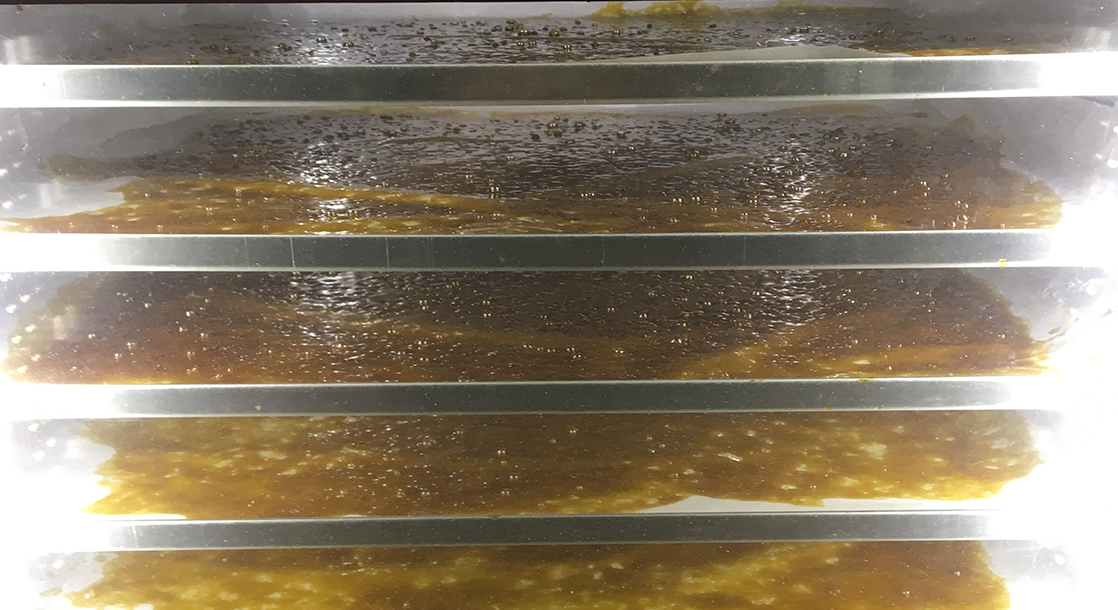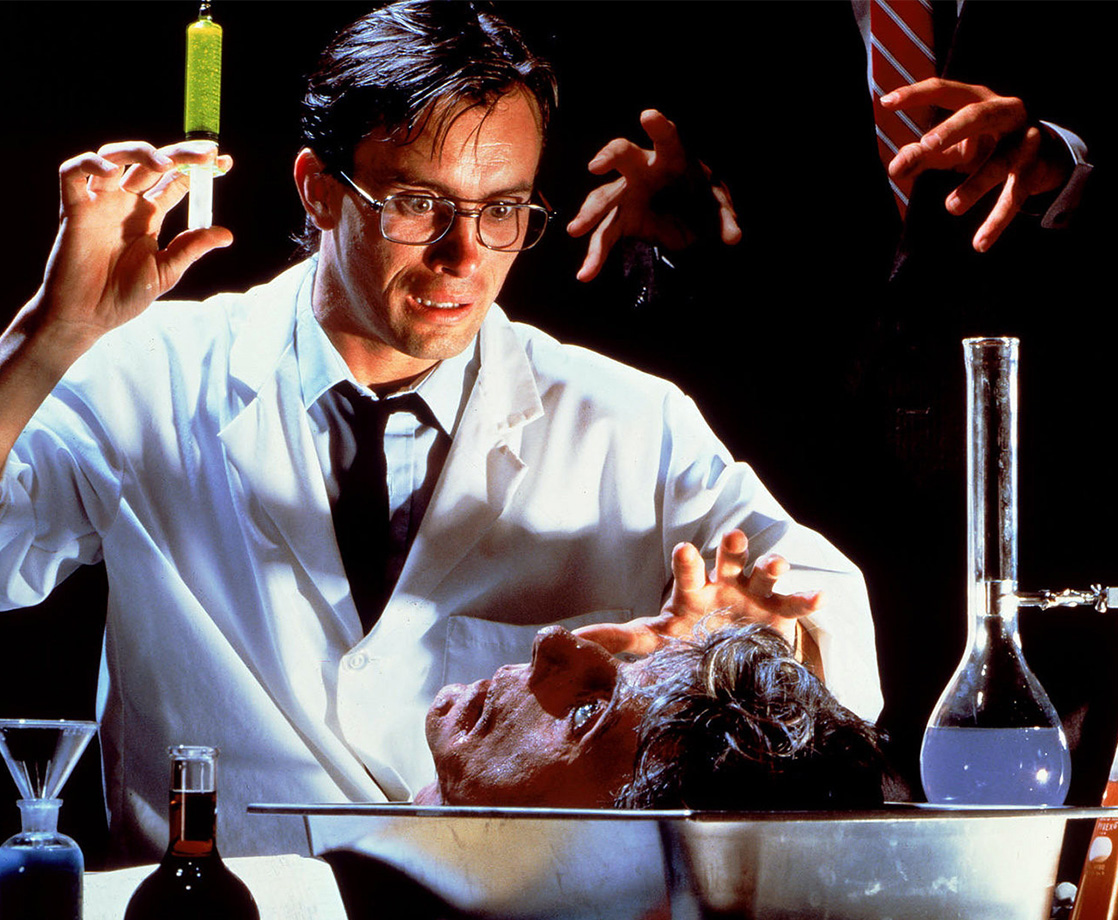All photos courtesy of Pete Pietrangeli
Extracts rocked the marijuana industry a few years ago, as state to state legality entered the conversation. A genre once defined by hash alone exploded into factions, where extreme levels of THC offered a harder approach to getting high, shrouded in uncertainty. Names like wax, oil, butter, shatter, dabs, and the sometimes questionable methods used to make them, were met with skepticism from the public as reports started coming in of kids blowing themselves up, attempting to make them at home.
Extracts are either made by processing the flower with a propellent like butane or propane (known as Butane Hash Oil or BHO), or blasting the flower with carbon dioxide (C02 oil). When ran through a closed loop system, both are perfectly safe. A closed loop system offers a way of extracting concentrate from flower in a sealed environment. The butane evaporated in the extraction process is recovered in a vacuum oven to be recycled, instead of contaminating the environment by mixing with air, potentially causing a deadly explosion.
Butane extraction received the brunt of criticism due to kids “open blasting,” a process where butane is released into the environment instead of recovered safely in the vacuum oven. While most think BHO’s stigma is a health-related one regarding the presence of butane in the oil, it’s actually part of a larger plan to demonize butane by certain facets of the marijuana industry hoping to take heat off themselves. Contrary to what many dispensary owners, dealers, and local know-it-alls will have you believe, the butane method is scientifically superior to the C02 method in terms of preserving the delicate terpene profile of great weed, which is responsible for its smell, taste, and nuanced high.
I sat down with two particularly knowledgeable sources on the topic, Boris, a semi-anonymous scientist who designs closed loop systems, and Pete Pietrangeli, industry vet and owner of the Melrose Ave dispensary LA Confidential.
“There’s a lot of misinformation in the marketplace,” says Pietrangeli. “Dispensary managers, bud tenders, and buyers will be snooty at extracts made with BHO because they think there’s some sort of health risk. Really, it comes off as ignorant.”
He believes the antipathy towards BHO comes from “kids blowing themselves up, not knowing what they’re doing,” due to the high demand overshadowing the risk. As a result of the BHO process being stigmatized, Pietrangeli currently uses C02 extraction for his pen company Acme Elixirs. Still, the industry veteran feels C02 will never rival the product of an extraction using butane—or “terp juice,” as it’s called—due to its harsh nature and terpene profiles being stripped in the C02 process. “We’re just waiting for the marketplace to mature, and circle back to the beautiful amber hash oil that actually resembles the breeder’s intentions.”
“The caveat of people making butane hash oil in open loop gave BHO a bad name,” Boris tells MERRY JANE. “A lot of people blew themselves up, caught themselves on fire, didn’t properly purge the butane out of the extract. The C02 machine makers jumped on that about two to three years ago, right when the whole [stigma] was starting to grow. They tried to use that as a marketing point for themselves.”
Pietrangeli adds, “There was a group lobbying for cannabis growers to be unionized, and their strategy was an anti-BHO campaign trying to sway opinions from looking at extracts as the bad guy, to looking at at BHO as the bad guy. So now you see all these brands out touting solventless CO2. Anything higher than 70-90% THC, they’re lying. You can’t get C02 to test that high with THC, there’s just no way. There’s all this lying and misinformation in the marketplace. People think they’re buying something that they’re not.”
A common misconception is that C02 oil is solventless, while BHO is not. No oil is solventless. Carbon dioxide is a solvent just like butane. C02 is not toxic, leaving no residual. It’s vapor pressure is so high it simply disappears. While butane has no lethal dose and is approved for food processing by the FDA, it’s certainly not as innocuous as C02. Butane must be properly removed, a step often botched by the kids blowing themselves up in their parents’ basement.
“I don’t know what the parts per million of butane exists in BHO concentrate,” says Pete, “but I do know when I order flan at the Argentinian restaurant down the street, the guys are back there blasting the thing with a butane torch to crust it. I know that when I’m at a barbecue and they’re grilling with a propane grill, I’m eating the hamburgers.”
The problem with C02 oil is that its high pressure strips the plant entirely, while butane does not. The molecules of butane dissolve not just the cannabinoids but also the whole spectrum of lighter, more volatile terpene compounds from the plant into the concentrate, meaning the hash will maintain a strain-specific smell and high if you use BHO extraction. “To recreate an oil that truly resembles the bud it came from, you need a solvent capable of capturing that whole spectrum of terpenes without damaging them,” says Boris.
C02 is attractive to many looking to bank in the concentrate industry because it allows you to get away with running poor quality flower. In other words, since companies are producing a homogeneous product, there’s really no point in using great weed during C02 extraction, since you’re stripping away everything but the THC anyway. Therefore, consumers should be wary of how hash vendors market products made using this process. “Unless they’re reintroducing native terpenes like we do at Acme, which most companies are not doing, they’re branding something that doesn’t exist. You’re not getting the feeling of a specific strain, you’re just getting the feeling of THC,” explains Pietrangeli.
The legal future of BHO depends on who’s lobbying in Washington, as well as those who can sway the public’s view in a factual direction. While the technology to process butane in a closed loop system has been revolutionary, a bad reputation could eclipse a multitude of advantages. With the proper tools, ventilation, and minds behind the process, BHO has the potential to replace C02’s status as preferred concentrate. However, its future is as uncertain as the future of the marijuana industry itself, one no one can predict.
At the end of the day, C02 extraction is a “less efficient process, and, in my humble opinion, produces a less desirable product,” says Boris. That said, we still shouldn’t let teens near propane tanks any time soon.













